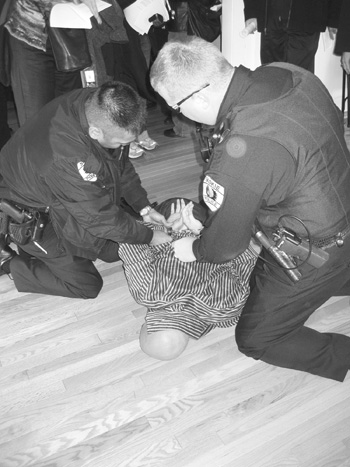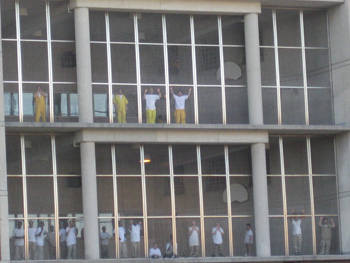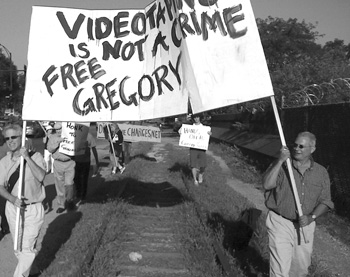Revolution #211, September 12, 2010
A Grave Injustice Has Been Perpetrated...
Free Gregory! No Jail Time!
A grave injustice has been perpetrated! In an outrageous trial, for "crimes" that never happened, a young man who came out of prison and took up revolutionary politics was convicted in a Skokie, Illinois, court on August 26 of three totally trumped-up criminal misdemeanor charges of trespass, simple battery (on a cop) and resisting arrest. In an additional outrage, instead of allowing Gregory to remain out of jail on bond pending a sentencing hearing, the judge revoked his bond and he was taken directly from the courthouse to jail. The sentencing hearing is September 8, where he faces as many as three years in jail. This railroad must be stopped!
 |
|
Gregory being arrested for videotaping Sunsara Taylor at the Ethical Humanist Society, November 2009. |
Gregory is a young man who came through hard times, who got caught up in the life that so many youth get caught up in and went to prison. But during his time in prison, and after his release, he began to question the nature of the system that put him and millions of others behind bars. He began to read Revolution newspaper in prison. He broke with the dog-eat-dog outlook. And, as he put it in a statement he issued before his trial, "Besides studying broadly and reading as much as I could get my hands on while I was locked up, I also began to develop as a writer." Several of his writings were published and he earned a paralegal diploma while personally litigating a federal civil rights lawsuit challenging prison policies. And, as he put it in the statement, "Now my life is dedicated to the struggle to end all exploitation and oppression and getting to a world where people contribute what they can to society and get back what they need to live a life worthy of human beings."
Changing the Rules in the Middle of the Game
This all began when Gregory videotaped a brief statement by Sunsara Taylor at the Ethical Humanist Society of Chicago (EHSC) in Skokie last November. Gregory committed no crime; he damaged no property; he hurt no one. In fact, HE was brutalized and maced by the police.
The prosecutor said in her opening statement: "...this is a simple case. We have a person unwilling to comply with a reasonable request. Had he kept his camera off, we would not be here today." That was not the case. Any reasonable, thinking person would ask: "What kind of system of 'justice' sends a person to jail for turning on a camera?!!" Nothing about this case was simple—or just.
The day before trial the defense turned over a copy of Gregory’s video, which clearly showed no one told him not to enter the premises. Nor did anyone tell him at any time while that video camera was recording that he must leave or he would be arrested, which is part of the requirements of the trespassing law. In the face of the video evidence, the prosecution simply rewrote their case! On the day the trial opened—and in the face of strenuous objections from the defense—the prosecution was allowed by the judge to revise key allegations on which the battery and resisting charges that had been filed last November were based.
The battery charge was now specified as intentionally making "physical contact of an insulting or provoking nature" and not "bodily harm." The prosecution falsely claimed Gregory intentionally put his hands on Officer Bello’s chest and pushed him back an inch, which they then claimed constituted battery.And they changed the time and place at which the supposed battery occurred. The prosecution set the bar as low as they could because there was no evidence of any harm done to the cop and certainly no medical evidence. In fact, Officer Mendoza, the other cop who testified, was standing within inches of Gregory when he supposedly committed this "battery" and yet failed to mention it in his testimony! This charge was put on Gregory not only to justify the beating the cops gave him but to hang him with a "violent" crime.
The changes in the allegations of the resisting charge were equally egregious. First, the prosecution’s story as to which officer was involved changed at the last minute from Officer Bello to an Officer Mendoza. If such resistance actually happened, how did it magically change from one cop to the other between November and August? And how was this particular offense completely overlooked until more than nine months after it supposedly occurred? And second, the prosecution stated a different location where this supposed "resisting" occurred. It now took place outside the auditorium and not inside it.
The judge refused to allow the original police report to be used by the defense to challenge the blatant inconsistencies in the prosecution witnesses’ changing stories. Then, after the judge made all these rulings in favor of the prosecution—and refused the defense request for time to prepare to defend Gregory against the changed story and allegation—the trial began. This is the much vaunted American justice system in action—if the defendant presents hard evidence proving his innocence and revealing the state’s claims to be false, the state is allowed to change their story to try to convict the defendant!
The Illinois trespass law states that you must be ordered to leave, and then you must show your intent to remain after you have been given notice to leave. On the video Bello is clearly heard asking Gregory in a loud voice only to "step outside." And an eyewitness who sat right next to Gregory testified on the stand that she did not hear Bello order Gregory to leave or say anything about trespassing. The prosecutor predicated the trespass case on the testimony of one cop, Bello, who had been hired by the EHSC for that morning. He claimed that he whispered to Gregory to stop filming or he would be arrested. How convenient! The only evidence the prosecution presented was the claim of a whispered command that supposedly only the defendant and the cop could hear. So Bello moved the time and place of his supposed order to leave to when there was no one in whispered earshot and there is no video footage, so that it is the word of the cop against Gregory.
Together with this paper-thin lie, the prosecution in the final closing argument to the jury distorted the legal definition of "trespassing," equating it with breaking any rules of the property owner. The legal "logic" supposedly being that if a property owner says put down the camera and the person doesn’t comply, they are trespassing. Again, this is not the legal definition of trespassing in Illinois, which requires that you must be ordered to leave and then show your intent to remain after being given notice to leave. When the defense objected to this mis-statement of the law, it was overruled.
Charging the Victim of Police Brutality
 |
|
Prisoners at Cook County Jail respond to a demonstration demanding “No Jail Time” for videographer Gregory who was hauled to jail without bond immediately after a completely unjust and outrageous verdict, August 26. |
Photos given to the prosecution by the defense ahead of trial, as required, showed Gregory being brutalized by the police. The prosecution went on the offensive with these pictures, putting their own twisted spin on them to tell the jury that what they were seeing was evidence of wrongdoing by the defendant, not by the police.
Charging the victim of police brutality with resisting arrest and battery on a police officer is a police practice so common it has a name, "cover charges." (Cover charges are charges the police press when they need legal justification to "cover" their brutality. [See acslaw.org/node/16288.]) In one photo, Gregory’s shirt is seen hanging in shreds, exposing lacerations on his trunk. But according to the prosecutor this was not because the police were violently grabbing and pulling on him, but because he was violently resisting! Another photo showed four to five big cops on top of Gregory... but this wasn’t massive overkill by the cops... no, it was interpreted by the prosecutors and their witnesses as the force needed to subdue the 140 pound, 5'6'' defendant. Bello, the cop who maced Gregory, readily admitted Gregory had contusions and lacerations and needed medical care, but the prosecutor argued Gregory did it to himself!
In an hour and a half, the verdict was returned of guilty on all charges—a completely unjust and outrageous verdict.
Retaliation for Radical Transformation
After the verdict, the prosecutor demanded revocation of bail on the basis that Gregory had spent years in prison for crimes stemming from when he was young. The defense attorney protested immediately, but the judge cut him off, agreed with the prosecution and further escalated the vindictive persecution by revoking bail because of the jury’s guilty verdict on three misdemeanors.
 |
|
Protest against the outrageous trial and conviction of videographer Gregory, August 26. |
This is highly unusual at the misdemeanor level, especially because the defendant never violated his bond before trial. Gregory is employed and obviously has strong roots in the community, since the courtroom was packed every day, with a line waiting to get in.
Many who have heard of this case, its outcome and the revocation of bail for these misdemeanors ask: Why was Gregory ever charged? Why did this ever get to trial, how could the jury find him guilty, and how could the judge revoke his bail for such minor charges? They say there must be more to it. And there is.
More than one person has pointed out that Jon Burge, the notorious Chicago police detective who tortured many people and sent them to prison and death row based on false coerced confessions, and who was finally convicted this spring—30 years later—of felony lying to a federal agent, is out on bail until his November sentencing.
By contrast: A young man wrenches himself out of the dog-eat-dog mentality and life into which this system drives so many. In the bowels of the U.S. prison system he questions, he studies, he begins to understand, and live a life based on the fact that, as he put it, "the basis exists to emancipate all of humanity from the oppressive relations of class society, and unleash people to flourish in ways undreamed of under the confines of this capitalist system." But for Gregory, the person who has inspired many other people with his moral, ethical, and political transformation, the prosecutor and the judge took the extraordinary step of revoking his bail before sentencing.
Due Process or Political Suppression?
The judge stated in the beginning of the trial that "politics are not at all the issue in this arrest..." but politics are the issue—not only in the arrest but throughout this whole vindictive railroad. A major escalation of the railroad against Gregory came in April, a week after Gregory’s defense committee sponsored a showingof the documentary Disturbing the Universe, about William Kunstler at Northwestern University. Emily Kunstler, one of the filmmakers; Thomas Geoghegan, labor lawyer and author; Gregory’s lawyer, Scott Frankel; and Gregory appeared on a panel together. This was the first time since his arrest that Gregory spoke publicly, describing his past as a prisoner and how he had transformed through his contact with the Prisoners Revolutionary Literature Fund and Revolution newspaper. He denounced the ban of Revolution newspaper in California prisons and spoke about how important this newspaper was to him and why the authorities are trying to stop it. This theme of transformation resonated with the North Shore and Northwestern student audience and signaled to the broader world that connections and support for this revolutionary ex-prisoner were being developed among sections of the people who normally are inundated with messages that prisoners are "incorrigible predators" and "the worst of the worst."
This developing broad support was seized on by the prosecution: one week later the state struck back with a vengeance. At what was supposed to be a routine status hearing to set a trial date, the prosecution gave notice that they were filing a contempt petition against Gregory because of his defense committee’s website, which talked about his case. The prosecution petition itself was blatantly political—pages and pages of printouts of the defense committee website, including publicity for the Kunstler movie event and other events with speakers like Bill Ayers, Marc Falkoff, and Sunsara Taylor. The judge threatened the defense attorney with disbarment because his name appeared on the website (as Gregory’s attorney!). At a later hearing the contempt charge was defeated, but that judge took the opportunity to rail that "you are not going to turn my courtroom into a circus" and to warn Gregory that having a defense committee to support him was going to "harm" his case—an unmistakable threat to back off the political struggle—while asserting at the same time "this is not political, there are no martyrs here." Not only did Gregory not repudiate his revolutionary politics or the support of the defense committee, but the committee continued to expand their outreach and held another event in June with a panel of Bill Ayers, Cindy Sheehan, and Sunsara Taylor.
One of the big claims of America is its so-called freedoms—in this country, there is supposedly no political suppression. To cover up what is actually a political trial, criminal charges are brought to suppress political views and movements; political acts are depicted as criminal acts and then at trial, the actual events are twisted to fit this framework. The judge made a big show about being supposedly "fair and just." But make no mistake, this is political suppression, pure and simple. The system has bared its teeth.
And this system has a particular necessity to "make an example" of people like Gregory, who have come out of the prison system and have come to understand the nature of this system and to work for revolution. From the point of view of a system of oppression and exploitation that has no future for millions but its hell-hole penitentiaries, such an example is something to put a stop to. But for the very same reason, people from all walks of life must refuse to let this system get away with this attack.
The outrageous verdict and revocation of bond for misdemeanors has brought many new people into support. Indymedia’s recent national article after the trial identified this case as a "cause célèbre, in Chicago and nationally." One lawyer contributed $300 with a statement to Gregory that all kinds of people who Gregory doesn’t even know support him. The defense committee has received written statements from many people whose lives have been touched by Gregory, urging the judge to free him.
A petition has been launched online to tell the court that Gregory should get no jail time and he must be released on bond immediately. This can be signed at worldcantwait.net and spread through emails, lists, blogs, Facebook, Twitter, and more. If you are in the Chicago area, come to the sentencing on Wednesday, September 8 at 9:30 am at Cook County Courthouse, 5600 W. Old Orchard Road, Skokie. And get in touch with the Ad Hoc Committee for Reason at adhoc4reason@gmail.com to find out more ways to help overturn this completely unjust conviction. Funds are urgently needed to appeal this outrageous conviction and denial of bond. Checks can be sent to attorney Scott Frankel, 77 W. Washington, Suite 1720, Chicago, IL 60602. (Please mark "Gregory’s appeal" in the memo line.)
If you like this article, subscribe, donate to and sustain Revolution newspaper.



